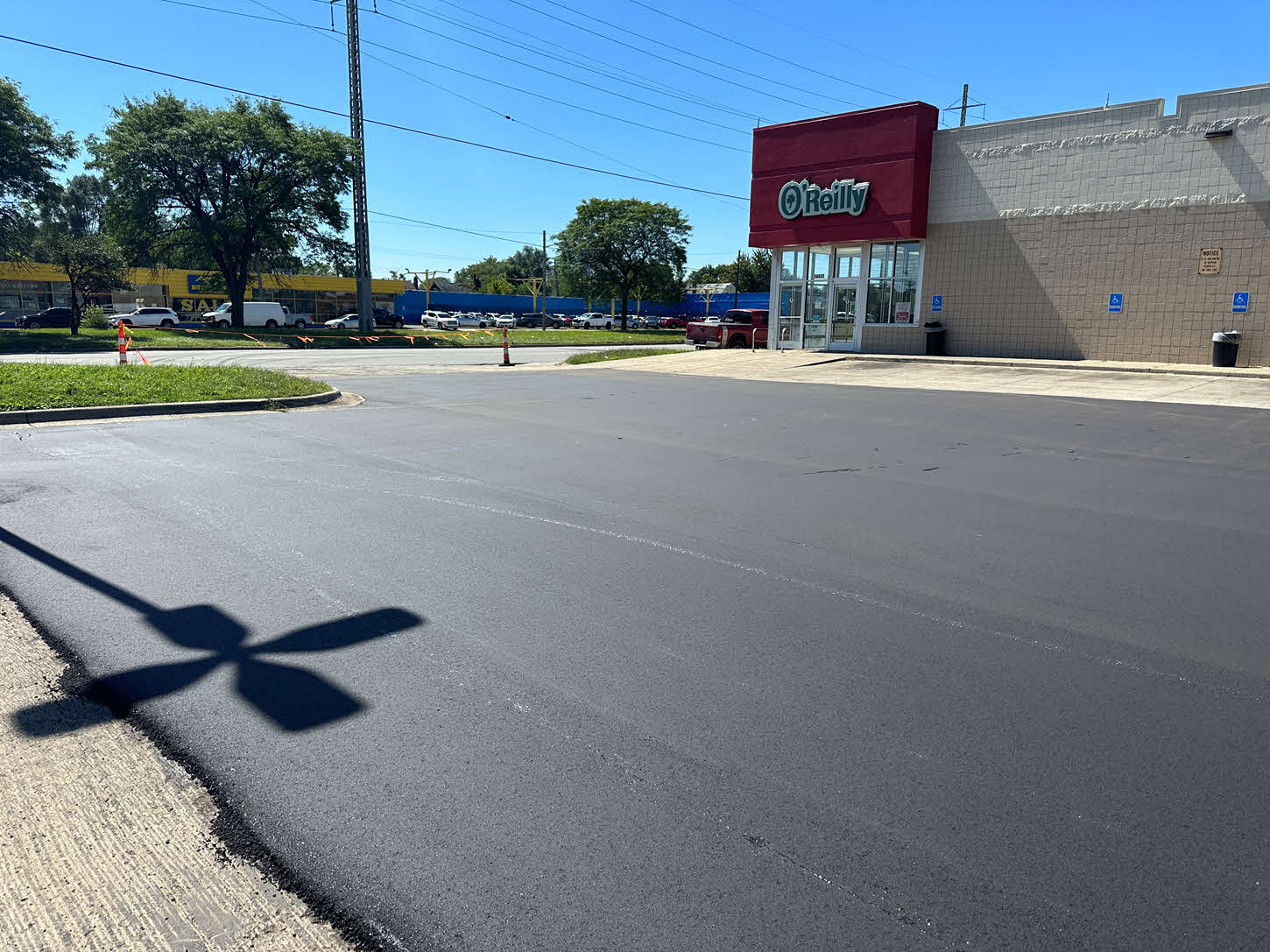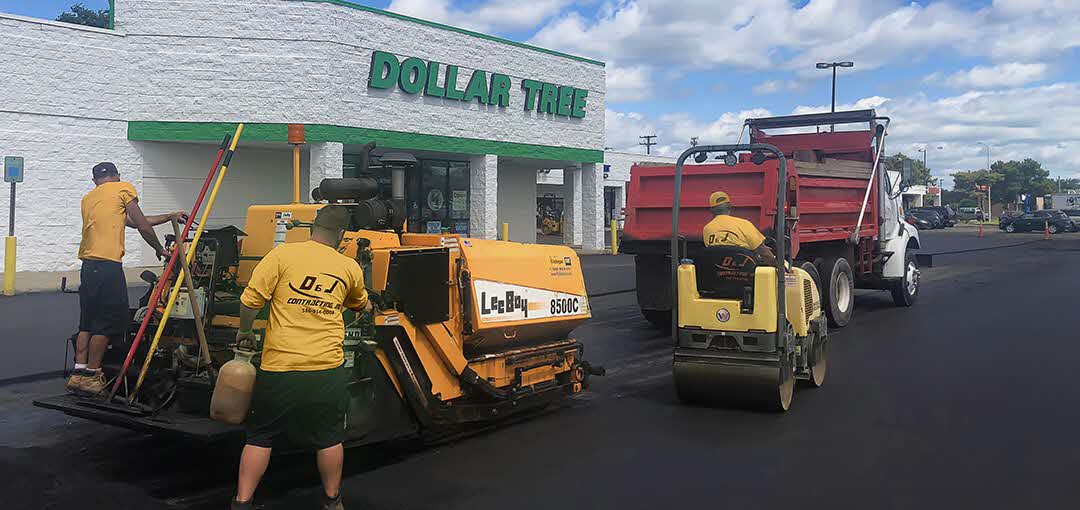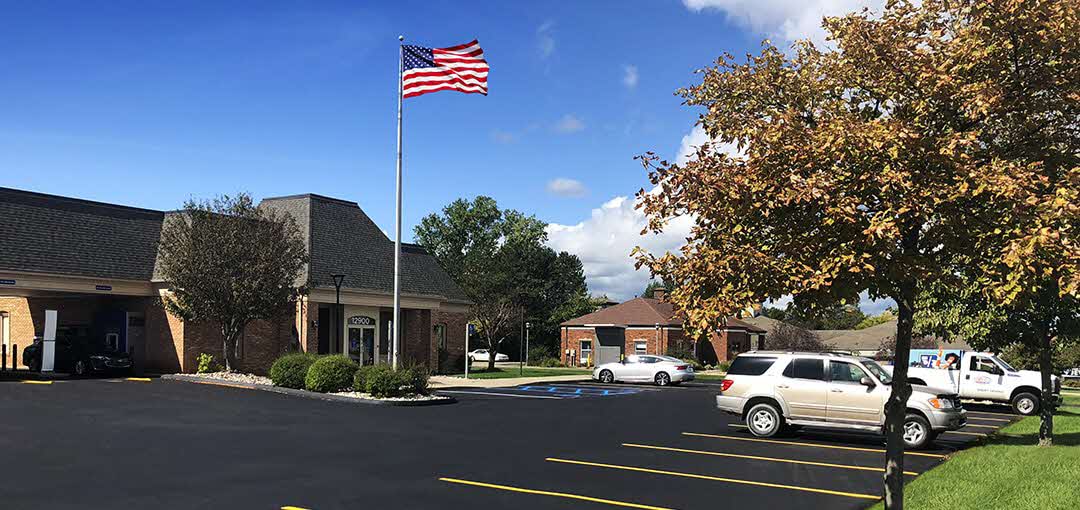Parking Lot Maintenance inHarrison Township, MI
Keeping Your Parking Lot Safe and Well-Maintained Year-Round
We Are Locally Owned & Operated For Over 37 Years
Contact Us Today!
We Serve Businesses In And Around The Following Cities:
About Parking Lot Maintenance
Comprehensive Guide to Parking Lot Maintenance for Commercial Properties in Harrison Township
The Importance of Parking Lot Maintenance in Harrison Township
In the bustling commercial landscape of Harrison Township, the significance of well-maintained parking lots cannot be overstated. These essential spaces serve as the first point of contact for customers and clients visiting businesses. A well-cared-for parking lot is often an indicator of a well-managed property, instilling a sense of professionalism and care. Parking lot maintenance, therefore, is not merely an obligation but a strategic aspect of commercial property management that greatly impacts a business’s brand image. The aesthetic and functional appeal of a parking lot can significantly influence customer perception and, ultimately, the success of a business.
Beyond aesthetics, regular and effective parking lot maintenance reduces the likelihood of accidents and preserves the structural integrity of the pavement. In a commercial area like Harrison Township, characterized by high traffic density and varied weather conditions, the upkeep of parking spaces is crucial to ensuring safety and enhancing accessibility for all users. This guide aims to provide a comprehensive understanding of parking lot maintenance, exploring not just the processes involved, but also the significant benefits and real-world applications that can enhance business operations in Harrison Township.
The Process of Parking Lot Maintenance
The maintenance of commercial parking lots involves a systematic approach that begins with regular inspections and assessments. Identifying potential issues such as cracks, potholes, and drainage problems early can prevent more serious issues from developing. These inspections should ideally be carried out biannually, although high-traffic lots may necessitate more frequent evaluations.
The first step in any maintenance program is cleaning. This involves removing debris, leaves, and litter which can accumulate and accelerate wear and tear. Pressure washing may also be employed to remove oil stains and buildup that can make the surface slippery, presenting a hazard to pedestrians.
Next, addressing surface-level issues such as cracks is vital. Crack sealing is an essential preventative measure that prevents water from seeping beneath the asphalt, a leading cause of potholes and major structural damage. Quality crack sealant should be flexible enough to withstand temperature changes and durable enough to last several seasons.
Sealcoating is another fundamental step in the maintenance process. It involves applying a protective layer over the asphalt to guard against the elements, such as UV rays, rain, and chemicals. This layer not only protects the asphalt from degradation but also revives the parking lot’s appearance, giving it a fresh, appealing look.
Pothole repair, though sometimes more involved, is crucial for safety and longevity. Proper repair involves cleaning the pothole, filling it with suitable materials, and compacting it to ensure a level surface. Using high-quality materials is essential for durable repairs and can save money in the long term.
Other important aspects include line striping and signage maintenance. Clear, visible lines are essential for directing traffic and ensuring customer safety, while signage aids in efficient parking lot management, reducing the likelihood of confusion and accidents.
Benefits of Regular Parking Lot Maintenance
The advantages of regular parking lot maintenance extend beyond mere appearance. For businesses in Harrison Township, consistently maintained parking lots can increase safety, reduce liability, and enhance property value. Firstly, a safe parking area reduces the risk of accidents and injuries, shielding businesses from potential legal claims.
Moreover, regular maintenance prolongs the life of a parking lot. By addressing minor issues before they escalate, businesses can avoid costly repairs or total replacements. This not only ensures continued access without disruption but also leverages budget efficiency. A proactive maintenance strategy, such as that provided by D&J Contracting, can ensure high-quality service tailored to specific property needs.
Enhancing curb appeal is another notable benefit. A well-maintained parking lot invites business, creating a welcoming environment for clients and customers. Businesses with attractive and secure premises are likely to experience higher customer retention, thus positively influencing their bottom line.
In terms of environmental impact, parking lot maintenance can contribute to sustainability efforts. Maintenance practices such as proper drainage system installation and crack sealing reduce pollutant runoff into local waterways, emphasizing environmentally-friendly property management.
Real-World Applications and Localized Insights
The effectiveness of parking lot maintenance can be illustrated with examples from businesses across Harrison Township. Suppose a local shopping center repeatedly addressed minor repairs and utilized sealcoating every few years. As a result, the center noticed a marked increase in customer satisfaction and a decrease in complaints about parking-related issues.
Another example is a corporate office that hired parking lot maintenance services to implement a comprehensive upkeep strategy, including regular inspections and timely crack repairs. They reported a significant reduction in repair costs over time and an improved corporate image. Customers frequently remark on the ease of access and safety of the parking facilities, often taking this into consideration when choosing their service provider.
Encouragingly, many businesses have found success in partnering with professional services such as those provided by D&J Contracting. Known for their expertise in parking lot maintenance near me, their tailored approach ensures that every repair, sealcoat, and striping task aligns with the unique needs of the property, offering more than just surface-level solutions.
Strategic Partnering for Effective Maintenance
For business owners and property managers in Harrison Township, collaborating with a trusted maintenance provider like D&J Contracting offers numerous advantages. Their comprehensive services cover everything from routine assessments to emergency repairs, ensuring that parking lots remain in excellent condition throughout the year.
What sets a strategic partner apart is their ability to deliver not only immediate repairs but also long-term maintenance plans that align with a property’s goals. By understanding the specific challenges and conditions of Harrison Township, companies like D&J Contracting can tailor their services to address the most critical aspects of parking lot care.
Engaging with a professional service ensures that the materials used are of the highest quality and that all procedures comply with local regulations. Additionally, outsourcing maintenance allows businesses to allocate more resources towards their core operations, thereby enhancing overall productivity and growth.
A Future-Proof Investment
A commitment to regular parking lot maintenance is a forward-looking investment that pays dividends over time. For commercial properties in Harrison Township, the blend of aesthetics and functionality achieved through diligent upkeep can significantly affect business outcomes. By minimizing hazards, prolonging pavement life, and enhancing customer experience, the benefits of diligent parking lot care cannot be overstated.
To maximize these benefits, ongoing evaluations and adaptive planning are essential. By ensuring that maintenance strategies evolve in line with changing needs and emerging technologies, businesses can protect their infrastructure while also contributing to a more sustainable environment.
As you reflect on the impact of good parking lot maintenance, consider reaching out to industry experts who can provide tailored advice and services. D&J Contracting stands ready to guide you through this process, ensuring that your property remains not only safe and appealing but also strategically positioned for future success.
Parking Lot Maintenance Gallery


Call Us Today to receive your Free Quote for
Parking Lot Maintenance in Harrison Township
Serving: Harrison Township, Michigan

About Harrison Township, Michigan
Harrison was first designated as the new centralized location of the county seat of Clare County in 1877. It would become a replacement for Farwell, which was the first county seat when Clare County was formally organized in 1871. The Flint and Pere Marquette Railroad platted the village in 1879 and set aside property for a new county government after the previous courthouse in Farwell burned down. The Harrison post office opened on January 27, 1880 and was named after former president William Henry Harrison. The new community incorporated as a village in 1885 and later as a city in 1891.
According to the U.S. Census Bureau, the city has a total area of 4.03 square miles (10.44 km), of which 3.71 square miles (9.61 km) is land and 0.31 square miles (0.80 km) is water.
The city’s motto is “20 Lakes in 20 Minutes” due its proximity to numerous lakes. Budd Lake is mostly located within the city limits, while the northern coastline extends into Hayes Township. The only other lake within the city limits is Little Long Lake, which also extends into Hayes Township.
 US 127 runs south–north just outside the eastern border of the city.
US 127 runs south–north just outside the eastern border of the city.
 Bus. US 127 is a business route of US 127 that runs through the center of the city.
Bus. US 127 is a business route of US 127 that runs through the center of the city. M-61 is a state highway that enters the west-central part of the city and then runs concurrently with Bus. US 127.
M-61 is a state highway that enters the west-central part of the city and then runs concurrently with Bus. US 127.
| Census | Pop. | Note | %± |
|---|---|---|---|
| 1880 | 129 | — | |
| 1890 | 752 | 482.9% | |
| 1900 | 647 | −14.0% | |
| 1910 | 543 | −16.1% | |
| 1920 | 399 | −26.5% | |
| 1930 | 458 | 14.8% | |
| 1940 | 727 | 58.7% | |
| 1950 | 884 | 21.6% | |
| 1960 | 1,072 | 21.3% | |
| 1970 | 1,460 | 36.2% | |
| 1980 | 1,700 | 16.4% | |
| 1990 | 1,835 | 7.9% | |
| 2000 | 2,108 | 14.9% | |
| 2010 | 2,114 | 0.3% | |
| 2020 | 2,150 | 1.7% | |
| U.S. Decennial Census | |||
As of the census of 2010, there were 2,114 people, 913 households, and 524 families residing in the city. The population density was 568.3 inhabitants per square mile (219.4/km). There were 1,306 housing units at an average density of 351.1 per square mile (135.6/km). The racial makeup of the city was 93.7% White, 1.7% African American, 0.8% Native American, 0.5% Asian, 0.2% from other races, and 3.1% from two or more races. Hispanic or Latino of any race were 2.5% of the population.
There were 913 households, of which 26.9% had children under the age of 18 living with them, 37.0% were married couples living together, 15.9% had a female householder with no husband present, 4.5% had a male householder with no wife present, and 42.6% were non-families. 37.2% of all households were made up of individuals, and 17.5% had someone living alone who was 65 years of age or older. The average household size was 2.18 and the average family size was 2.79.
The median age in the city was 42.1 years. 21% of residents were under the age of 18; 10.8% were between the ages of 18 and 24; 22.4% were from 25 to 44; 27.4% were from 45 to 64; and 18.4% were 65 years of age or older. The gender makeup of the city was 49.1% male and 50.9% female.
As of the census of 2000, there were 2,108 people, 857 households, and 526 families residing in the city. The population density was 563.3 inhabitants per square mile (217.5/km). There were 1,187 housing units at an average density of 317.2 per square mile (122.5/km). The racial makeup of the city was 94.78% White, 2.04% African American, 0.62% Native American, 0.71% Asian, 0.43% from other races, and 1.42% from two or more races. Hispanic or Latino of any race were 1.47% of the population.
There were 857 households, out of which 26.6% had children under the age of 18 living with them, 46.0% were married couples living together, 12.5% had a female householder with no husband present, and 38.6% were non-families. 35.2% of all households were made up of individuals, and 18.2% had someone living alone who was 65 years of age or older. The average household size was 2.24 and the average family size was 2.83.
In the city, the population was spread out, with 22.3% under the age of 18, 9.7% from 18 to 24, 25.6% from 25 to 44, 24.7% from 45 to 64, and 17.7% who were 65 years of age or older. The median age was 39 years. For every 100 females, there were 93.6 males. For every 100 females age 18 and over, there were 92.5 males.
The median income for a household in the city was $26,392, and the median income for a family was $35,179. Males had a median income of $32,500 versus $20,909 for females. The per capita income for the city was $15,443. About 14.1% of families and 18.5% of the population were below the poverty line, including 20.8% of those under age 18 and 15.1% of those age 65 or over.
The city of Harrison is served entirely by Harrison Community Schools, which is centrally located within the city and serves a large part of the northern portion of the county.
Mid Michigan Community College has a Harrison campus located just to the southeast in Hatton Township.
Call Us Today to receive your Free Quote for
Parking Lot Maintenance in Harrison Township
Related Services in Harrison Township, Michigan
We Serve Businesses In The Following Zip Codes:
48007, 48015, 48021, 48026, 48035, 48036, 48038, 48042, 48043, 48044, 48045, 48046, 48047, 48048, 48050, 48051, 48066, 48071, 48080, 48081, 48082, 48083, 48084, 48085, 48088, 48089, 48090, 48091, 48092, 48093, 48098, 48099, 48225, 48230, 48236, 48310, 48311, 48312, 48313, 48314, 48315, 48316, 48317, 48318, 48397